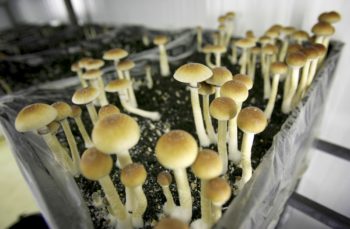Denver Voting on Decriminalization of Magic Mushrooms. (Having belonged to several mushroom clubs for fun and culinary experiences, we do NOT recommend magic mushrooms for several reasons: unknown effect on yourself- everyone can have a different experience, and if you have not correctly identified the mushroom, you can die a horrible death.)
April 17, 2019-By
Denver is now voting on whether it should become the first US city to effectively decriminalize mushrooms containing the psychedelic psilocybin — also known as magic mushrooms.
Initiative 301 would designate “the personal use and personal possession of psilocybin mushrooms” among people 21 and older as Denver’s lowest possible law enforcement priority, and prohibit the city from spending resources to pursue criminal penalties related to the use or possession of psilocybin mushrooms among people 21 and older.
It would also “establish the psilocybin mushroom policy review panel to assess and report on the effects of the ordinance.”
The initiative would not legalize magic mushrooms; they’d remain illegal under state and federal law. And it wouldn’t decriminalize or deprioritize the distribution and sales of psilocybin mushrooms — all of that could still be pursued by police.
Ballots containing the initiative were sent out Monday, Kyle Jaeger reported for Marijuana Moment.
Advocates for the measure argue that decriminalization would shift law enforcement resources away from pursuing nonviolent offenses. They claim that psilocybin is safe, nonaddictive or close to nonaddictive, and that a growing body of evidence suggests the drug has therapeutic benefits for illnesses ranging from depression to end-of-life anxiety to addiction.
Opponents worry that decriminalization could lead to more drug use. Especially in Denver, they’re concerned that decriminalization could perpetuate the city’s reputation as “a drug-friendly city,” Jackson Barnett reported for the Denver Post. Critics also point out psilocybin does have some risks — particularly, experts say, the possibility of accidents and traumatic experiences that can be psychologically damaging (especially among people predisposed to mental illness).
The measure seeks to put the brakes on criminal penalties for use and possession of psilocybin mushrooms. Its no-limit component results from mushrooms’ nature as a heavy, wet fungus that is then dried out, Matthews said. Proponents say prosecutors don’t always recognize the difference, but law enforcement is evolving.
“We’re a pretty progressive city when it comes to drug policy,” Matthews said, referring to the Denver’s mid-2000s marijuana decriminalization and to the state’s legal recreational sales that started in 2014.
“In some ways marijuana did open the door,” he said.
Matthew W. Johnson, a psychiatry and behavioral sciences professor at Johns Hopkins University School of Medicine, has researched psilocybin for possible use in treating anxiety and depression in cancer patients.
He said in an NBC News interview in June that the prospect of unfettered access to the drug conjures “real concerns about very real risks of psychotic disorders — what people refer to as a bad trip.”
“I speak firsthand to how intense these experiences can be,” he said.
UCLA psychiatry professor Charles Grob, who has also researched the drug, seemed to agree.
“If, in fact, it’s ever available on a mass basis, it would be imperative to have a strong education component so people could understand what these compounds are,” he said in a separate June interview. “They should not be treated in a trivial manner.”
Matthews says he’s moving forward with a clear mind and plans a long-term education and research strategy that includes a mayoral panel empowered by the initiative and tasked with reviewing its impacts.
“This is going to be a work in progress,” he said





